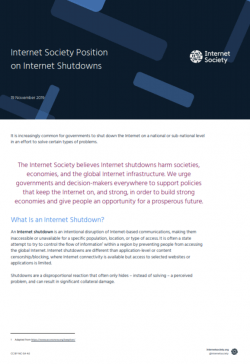It is increasingly common for governments to shut down the Internet on a national or sub-national level in an effort to solve certain types of problems.
The Internet Society believes Internet shutdowns harm societies, economies, and the global Internet infrastructure. We urge governments and decision-makers everywhere to support policies that keep the Internet on, and strong, in order to build strong economies and give people an opportunity for a prosperous future.
What Is an Internet Shutdown?
An Internet shutdown is an intentional disruption of Internet-based communications, making them inaccessible or unavailable for a specific population, location, or type of access. It is often a state attempt to try to control the flow of information[1] within a region by preventing people from accessing the global Internet. Internet shutdowns are different than application-level or content censorship/blocking, where Internet connectivity is available but access to selected websites or applications is limited.
Shutdowns are a disproportional reaction that often only hides – instead of solving – a perceived problem, and can result in significant collateral damage.
Recommendation: Keep the Internet On and Strong
By taking steps to prevent Internet shutdowns, countries will:
Uphold the integrity of the global Internet infrastructure
The strength of the global Internet relies on a shared responsibility among its users to uphold the integrity of its core infrastructure. Shutdowns that disrupt core Internet operations such as domain name services (DNS) or routing infrastructure (through BGP) within a country can have technical consequences far beyond a country’s borders. This includes:
- Internet users within a country experiencing a shutdown could lose access or experience reduced speed on interconnected networks if traffic needs to be routed through less optimal paths. Shutdowns that impact interconnection points or other significant infrastructure components could also impact connectivity and Internet performance in other countries, which could inadvertently harm international relations.
- Global Internet users will lose access to specific platforms or services hosted within the country experiencing a shutdown. These platforms and services may represent a critical component of an Internet-based workflow and/or support sites and applications located elsewhere.
Furthermore, attempts to give states the option to shutdown the Internet locally can weaken communication infrastructure inside the country and reduce its overall resilience.
Support national economic strength and stability
Countries around the world are finding economic growth opportunities by joining the digital economy. Growth in mobile broadband adoption has been tied to economic growth.[2]
Internet shutdowns are a detriment to growth as they have an immediate financial impact on a national economy. Shutdowns mean less economic activity, which translates into reduced profits for local businesses, lower tax revenues, and lower Gross Domestic Product.[3] The economic uncertainty that shutdowns create is cumulative, causing disincentives to invest and driving existing customers away from national service providers.
Furthermore, many individuals, organizations, and businesses around the world rely on Internet-based services that depend on critical functions like data storage, data processing, and financial transactions based in various countries. Disrupting access to these services inevitably reduces productivity, resulting in significant economic losses.
Promote long-term investment
In many countries, network connectivity is essential to the operations of businesses in nearly every sector. Continuous and uninterrupted Internet access is quickly becoming just as important as electricity.[4] Internet shutdowns present a risk for many businesses and investors, including those building infrastructure and/or developing services. This is because they signify that a country’s Internet infrastructure is not resilient nor reliable, and that the country’s government has the ability and the willingness to shut it down. Shutdowns also imply that a government believes taking such an action is acceptable, suggesting that the country’s economy is not ready to join the global digital economy.
Ensure e-government services are always available
E-government services depend on the Internet. More than that, the Internet provides tools to increase the efficiency and reduce the cost of providing government services. Shutdowns effectively turn off these government services and make the business of government less efficient and more expensive.
Enhance overall trust online
Internet shutdowns erode the trust people place in the infrastructure to be available and to work reliably when needed. Over time, people stop using unreliable networks, leading to reduced investment and further infrastructure decline.
Encourage peaceful demonstrations and social discourse
In some recent instances, governments have implemented or ordered Internet shutdowns in response to civil unrest. However, research has found that information blackouts resulting from these shutdowns can actually result in increased violence. Violent tactics that are less reliant on effective communication and coordination are substituted for non-violent protests that rely on the Internet for organization.[5]
Ensure emergency communication channels stay on
Shutdowns impact the ability of citizens to get accurate information from government sources in times of unrest or emergency. It also becomes harder for citizens to contact family members and friends in other parts of the country, or in other countries. The efforts of first responders and healthcare providers can also be hindered if a shutdown prevents their ability to effectively coordinate and communicate in the event of an emergency or natural disaster.
There is a lack of evidence to prove Internet shutdowns solve the issues that they are meant to address, and the potential collateral damage resulting from these actions is abundantly clear.
Internet shutdowns are harmful to the people, countries, and economies around the world.
The Internet Society encourages governments everywhere to support policies and decisions that build a strong Internet and keep it on.
Supporting resources:
- Internet Shutdowns Policy Brief
- Cost of Shutdowns Tool
- Internet Society Perspectives on Internet Content Blocking: An Overview
- The Scary Trend of Internet Shutdowns
- Internet Shutdowns Don’t Make Anyone Safer
- More governments are shutting down the Internet. The harm is far-reaching.
- Internet shutdowns cost countries $2.4 billion last year
- The economic impact of disruptions to Internet connectivity
Endnotes
[1] Adapted from https://www.accessnow.org/keepiton/
[2] https://spiral.imperial.ac.uk/bitstream/10044/1/46208/2/Goodridge%202017-05.pdf
[3] https://www.brookings.edu/research/internet-shutdowns-cost-countries-2-4-billion-last-year/
[4] https://globalnetworkinitiative.org/wp-content/uploads/2016/10/GNI-The-Economic-Impact-of-Disruptions-to-Internet-Connectivity.pdf
[5] https://papers.ssrn.com/sol3/papers.cfm?abstract_id=3330413
